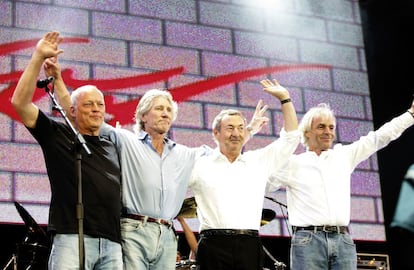Waters versus Pink Floyd: 35 years of conflict
Besides a dispute over the band’s legacy worth around €500 million, the two band members have been clashing over the war in Ukraine


Pink Floyd has made musical history, but the writing of it is not quite finished. A new song, a controversy over the war in Ukraine and a big financial deal in the pipeline are some of the loose ends waiting to be tied up.
Guitarist and singer David Gilmour announced the band’s break-up in 2014 after the release of the album The Endless River, which featured previously unreleased material from as far back as 1994. Since the death of keyboard player, Richard Wright, in 2008, Gilmour and drummer Nick Mason have lost any desire to continue. Gilmour’s announcement was seen as a definitive farewell from the iconic progressive rock group, whose success peaked in the 1970s. “It’s a shame,” he told the BBC. “But this is the end.”
Thirty-five years earlier, bassist and vocalist Roger Waters, the despotic frontman who took over from founder Syd Barrett in 1968, when Barret exited due to mental health problems, had left the band. His departure triggered a legal battle over the continued use of the name and material; the bandmates won. Now, Gilmour and Waters, are clashing again over politics: one supports the Ukrainian resistance and the other blames NATO, rather than Russia, for the conflict. Meanwhile, a deal is underway for the sale of the band’s extensive catalog of songs for around €500 million.
Despite announcing the band’s definitive end in 2014, Gilmour and Mason resurrected the group last April to do a track with Ukrainian singer Andriy Khlyvnyuk from Boombox. The song is called Hey Hey Rise Up and is an explicit and passionate appeal to support the Ukrainian resistance against Russia. The song was Gilmour’s expression of sympathy for the country of his daughter-in-law, the mother of his granddaughters. The question is why they didn’t just do the song under his own name.
Justifying his decision, Gilmour told Rolling Stone: “When I spoke to Nick, and he said he was willing to do it as Pink Floyd, it seemed like a no-brainer. We want to spread this message of peace, and we want to raise the morale of the people who are defending their homeland there in Ukraine. So why not?
Meanwhile, Roger Waters stirred controversy last August during an interview with CNN in which he explained why he had shown the image of Joe Biden in his last tour under the slogan: “War criminal.” He explained that the US president was guilty of inflaming the conflict in Ukraine instead of forcing Ukrainian leader Volodymyr Zelenskiy to negotiate. “This war is basically about the action and reaction of NATO pushing all the way to the Russian border, which they promised [former Soviet leader Gorbachev] they wouldn’t do,” he said. Waters had previously called Russian President Vladimir Putin’s attack on Ukraine “a criminal mistake in my opinion, the act of a gangster,” but advocated for negotiation rather than resistance. Earlier, he had supported the Russian annexation of Crimea, and criticized what he saw as Western “propaganda” against Russia. In the interview, which followed the controversial visit to Taiwan by US House of Representatives speaker, Nancy Pelosi, he maintained that the island belongs to China, and told the interviewer he ought to read more. A week later, during a concert, Waters addressed the audience, telling them that CNN had edited his remarks to make him look stupid.
The Ukrainian organization Myrotvorets has included Waters on its unofficial blacklist. The musician told Russia’s Tass news agency that he was not worried, calling it a futile effort by propagandists. Gilmour has been terse when asked about Waters’ political stance: “Let’s just say I was disappointed and let’s move on. Read into that what you will,” he told The Guardian in April.
Politically, the paths of the Pink Floyd members have diverged significantly. The lyrics of their glory years were emphatically anti-war, though cloaked in symbolism in order to remain ambiguous. Launching his solo career, Waters sharpened his left-wing profile: on his previous tour, there were anti-Trump messages and imagery in the shape of the former US president as a floating pig wearing a Klu Klux Klan hood and endowed with a very small penis, provoking boos and walk outs.
But the band’s legacy is strong enough to survive these controversies. Songs like Money, Wish You Were Here and Comfortably Numb have continued to be enjoyed in the concerts performed by its two main band members. Waters has staged dramatic performances – in 1990, he performed a live concert of The Wall where the Berlin Wall once stood. In 2018, the Us+Them tour also shone with scenic brilliance, which was documented in a film by Waters and Sean Evans. Now, Waters is touring North America with Roger Waters: This is Not a Drill.
Much more restrained in his performances, Gilmour’s voice on stage still managed to transport us back to Pink Floyd’s golden age until he retired in 2016 – the year he performed the Live at Pompeii concert to promote his solo career in the same Roman amphitheater in Pompeii where Pink Floyd recorded the album of the same name in 1972.
The songs demanded by the public at concerts are generally those composed by both Waters and Gilmour. The Dark Side of The Moon (1973) and Wish You Were Here (1975) were albums created as a team, and the band’s best songs were a joint-effort – in some cases with Wright also in the mix. But Waters’ need to be at the forefront was obvious on Animals (1977) and even more so on the 1979 album, The Wall, whose lyrics very much reflect his own personal traumas. He took the reins so firmly that he went as far as to fire Wright and rehire him as an employee – a humiliation for Wright that did, however, save him from The Wall tour’s disastrous financial fallout.
By the time the next album, The Final Cut was released in 1983, all the songs were by Waters and feature his voice to such an extent, there was hardly any room for Gilmour’s vocals or guitar work. In 1986, Waters demanded the band be dissolved, without taking into consideration that the other three might continue without him. From then on, while Pink Floyd has maintained its style, and has worked well live, it has failed to match its earlier creative prowess, nor have Waters solo albums reached the dizzying heights of the band’s 1970s heyday.
There was a significant reconciliation in 2005, a truce that brought the four main band members together on stage in London to perform four songs at Bob Geldof’s Live 8 festival, broadcast globally. Only Syd Barrett was missing: his sister Rosemary confirmed that he was not in a position to participate. At the time, Barrett was living a secluded life and wanted nothing to do with his old bandmates; he died the following year.
Waters, Gilmour, Wright and Mason played for 24 minutes at the festival, a performance that could have put an elegant full stop to the group’s history. But a couple of collaborations followed between Waters and Gilmour in a concert in Palestine in 2010, and between Waters, Gilmour and Mason in a single performance in London on The Wall tour in 2011.
The closest thing to a reconciliation that can be expected today is a deal for the sale of Pink Floyd’s songs. As Bloomberg reported in June, the band members are negotiating with Sony, Warner and BMG through representative Patrick McKenna. The Financial Times revealed last week that the giant Blackstone is also bidding. This investment group is not new to the business: its subsidiary Hipgnosis already owns rights to the work of Neil Young, Red Hot Chili Peppers, Shakira and Justin Timberlake. A transaction of that magnitude, which would include both the compositions and the exploitation of the brand and its merchandising, would be a less emotional end than the Live 8 concert, but much more lucrative for the band members.
Tu suscripción se está usando en otro dispositivo
¿Quieres añadir otro usuario a tu suscripción?
Si continúas leyendo en este dispositivo, no se podrá leer en el otro.
FlechaTu suscripción se está usando en otro dispositivo y solo puedes acceder a EL PAÍS desde un dispositivo a la vez.
Si quieres compartir tu cuenta, cambia tu suscripción a la modalidad Premium, así podrás añadir otro usuario. Cada uno accederá con su propia cuenta de email, lo que os permitirá personalizar vuestra experiencia en EL PAÍS.
¿Tienes una suscripción de empresa? Accede aquí para contratar más cuentas.
En el caso de no saber quién está usando tu cuenta, te recomendamos cambiar tu contraseña aquí.
Si decides continuar compartiendo tu cuenta, este mensaje se mostrará en tu dispositivo y en el de la otra persona que está usando tu cuenta de forma indefinida, afectando a tu experiencia de lectura. Puedes consultar aquí los términos y condiciones de la suscripción digital.








































